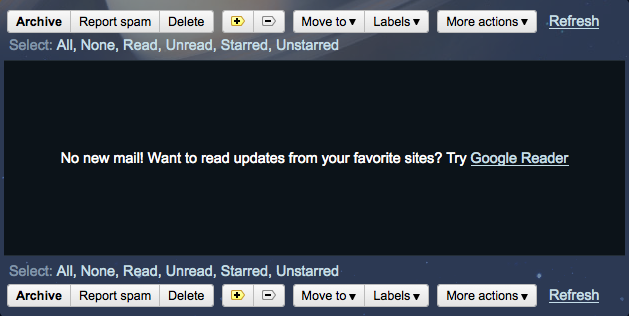A “Cult of Zero” is developing worldwide. Adherents drive the total emails in their inbox to zero, every day, with great results in improved productivity. I talk about how you can get your inbox to zero, and keep it there.
Unbelievers wonder why cultists obsess about their inboxes. Take a look at the church roster, and you might find a hint. Some are well-regarded executives, who somehow find time for impromptu meetings or a mid-day tennis game. Some are up-and-comers, picking their battles. Some are just calm folks doing a great job, unperturbed by late-breaking drama.
The main skill cultists hone, I’ve found, is being able to prioritize demands on their time. Getting your inbox to zero every day means you have learned many supporting behaviors: you have figured out how to identify and finish important work and reject or defer the rest.
Why do it?
Most of us use our inbox as one of many To Do lists. We retain emails to help us with future efforts or remind us of commitments. Optimistically, we think we’ll return to a thread eventually. Emails build up, and after a few days that important thread disappears into the inbox jungle.
We take a two day vacation, and it dooms us. Buried under hundreds of old emails are time-bombs, spam, demands for response, and questions. And soon, its utility as a To Do list becomes meaningless. Did I really have 3500 things to do?
Defense, Defense
You can find salvation. Start by going to your inbox. Right now.
But before you even delete the obvious spam, let’s talk defense. To get long-term benefits, invest some time upfront. If you keep unimportant stuff from landing in your inbox, you will have much less work to do in the days and months ahead.
First, look for spam and stop it from reappearing. If you are using Google Mail or another system with built-in spam detection, most of the unwanted email in your inbox can be stopped. Instead of just deleting email you don’t want, establish a new policy: Don’t delete the email until you have unsubscribed. Look for an “unsubscribe” link at the bottom or top. Use it. Only after you’ve unsubscribed should you delete a spam email.
Be ruthless about subscriptions. If you wouldn’t actually pay for someone to send you that subscription email, remember that your time is worth something: maybe you shouldn’t receive it at all. When an online store sends you a coupon, remember that you can look up most coupons online when you need one. Unsubscribe. When magazines send you tables-of-contents, remember that you can use an RSS reader, like Google Reader, to create topic lists to browse when you have spare time. Better yet, you can just search the web when you have a need. Unsubscribe.
Teach your friends not to send you unoriginal email. I have a rule: Each friend can forward one unoriginal email (meaning my friend didn’t actually create anything in it) exactly once per year. So, if that really funny compilation of jokes is really the best compilation of jokes you’re likely to see in the next year, forward it, but now you have to wait another year. When you make this rule, you enlist friends to help you achieve nirvana. Now they think twice: If my friend has limited time, is this how I want to use it?
Reply to each forwarded item from friends with your new once-a-year rule, and delete it. If you want to soften the message, remind your friends that you really want to hear from them, and that means you want to know what they are doing. Forwarded joke emails don’t bring you closer.
Convince friends to communicate casual news through Facebook or another social network site. Facebook has helped me stay in better touch with friends and family, while dramatically reducing inbox clutter. When I don’t want distractions, I don’t visit Facebook. When I want to see the latest on news on friends, even after a long hiatus, I check out their Facebook walls.
Get off most personal and work informational email groups. Make sure the email lists you are on address issues you must deal with. Sometimes, you can ask an organizer to remove you from an email list, but add you on the To: line when an exceptional situation requires your attention. For newsletters, you can often subscribe to view only on the web, using an RSS reader like Google Reader: this is perfect for most situations. Go there when you want to see the latest.
Getting Email Done
Now that we’ve put defensive barriers in place, let’s talk about routine email processing. Driving your inbox to zero is one of many productivity techniques advocated by Getting Things Done: The Art of Stress-Free Productivity by author David Allen. GTD recommends that we prioritize all incoming work requests, including email.
Create a ritual around managing your incoming mail. If no action is required, archive or delete it. If action is required and it takes less than 2 minutes, do it immediately, and then archive or delete it. If it is a time-sensitive newsletter and it is old, archive or delete: too late to do something now. If you can delegate to someone else, forward the email to them and delete.
Hopefully, at this point, you have less than 20 emails in your inbox. If not, I have sympathy, because you have a lot of big things to do.
Each remaining items in your inbox will take more than 2 minutes to complete. The best thing to do is to move these items into your ongoing To Do list, so you can prioritize them. Once the item is in your To Do list, archive the email.
Now you’ve reached Nirvana: nothing in your inbox. Welcome to the Cult of Zero!
What’s Next?
It took about a month for me to get both work and personal email to zero. I had unsubscribed from almost everything and taught my friends and colleagues to better respect my time. Subscriptions that remained were mostly ones I was paying for. (Funny how that works!)

Days after I hit zero the first time, a nervous tick forced me to check my email every hour or so. Not much new was in there. I wondered whether people still liked me! But, then I said, “OK, now I should work on the most important item in my to-do list.”
Suddenly more things were getting done: the change was dramatic. I finished some tough work projects, one of which saved the company a few million dollars. I filed tons of back expense reports (I travel a lot for work) and have stayed caught up. I set up drip watering systems in the back yard I’d long been putting off. I filed my taxes a month early (I had, more than once, driven to the airport post office 10 minutes before the midnight April 15 filing deadline).
I can better focus on complex issues. I relish that I am minimizing my “work in progress.” Cult membership supports a principle of “lean thinking,” one of the main pillars of agile management: Don’t take on work that you aren’t ready to focus on and finish. Don’t have a lot of projects started but not completed (“work in progress”).
Establishing, grooming and working through prioritized to-do lists is the noble topic of Getting Things Done: The Art of Stress-Free Productivity, a easy-read book that transformed how I work. An approach like GTD can help you sustain Cult membership.
Will you join the Cult of Zero? One of us! One of us!
Eating my own religious dog food, I remain your humble initiate.





Leave a Reply
You must be logged in to post a comment.